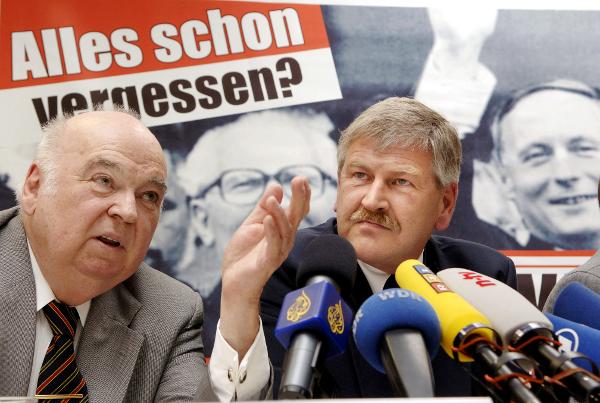Source

Source: picture-alliance/ dpa/dpaweb (c) dpa
The Munich publisher Gerhard Frey (left) founded the German People’s Union [Deutsche Volksunion or DVU] as an association in 1971. In 1987, the association reconstituted itself as a political party. For a time, the DVU was the largest right-wing extremist party in the Federal Republic of Germany (1990: 22,000 members). It won seats in the state parliament [Landtag] of Saxony-Anhalt in 1998 and in the Brandenburg state parliament in 1999. Another right-wing extremist party, the National Democratic Party of Germany [Nationaldemokratische Partei Deutschlands or NPD], which was founded in 1964 and had around 7,000 members in 2008, also scored electoral successes in Saxony and Mecklenburg-West Pomerania. To avoid competition, on January 15, 2005, the DVU and the NPD signed a "Germany Pact," in which they agreed not to run against each other in elections. The parties have much in common: anti-Semitism, agitation against Germany’s alleged infiltration by foreigners [so-called Überfremdung], social populism, and historical revisionism, particularly with regard to National Socialism. This photograph shows DVU party leader Gerhard Frey and NPD chief Udo Voigt unveiling their posters for the 2005 Bundestag elections at a press conference in Berlin on August 4, 2005. The poster behind them shows Erich Honecker and Oskar Lafontaine and asks “All forgotten?” – an allusion to the Communist past of the Left Party/PDS.

Source: picture-alliance/ dpa/dpaweb (c) dpa